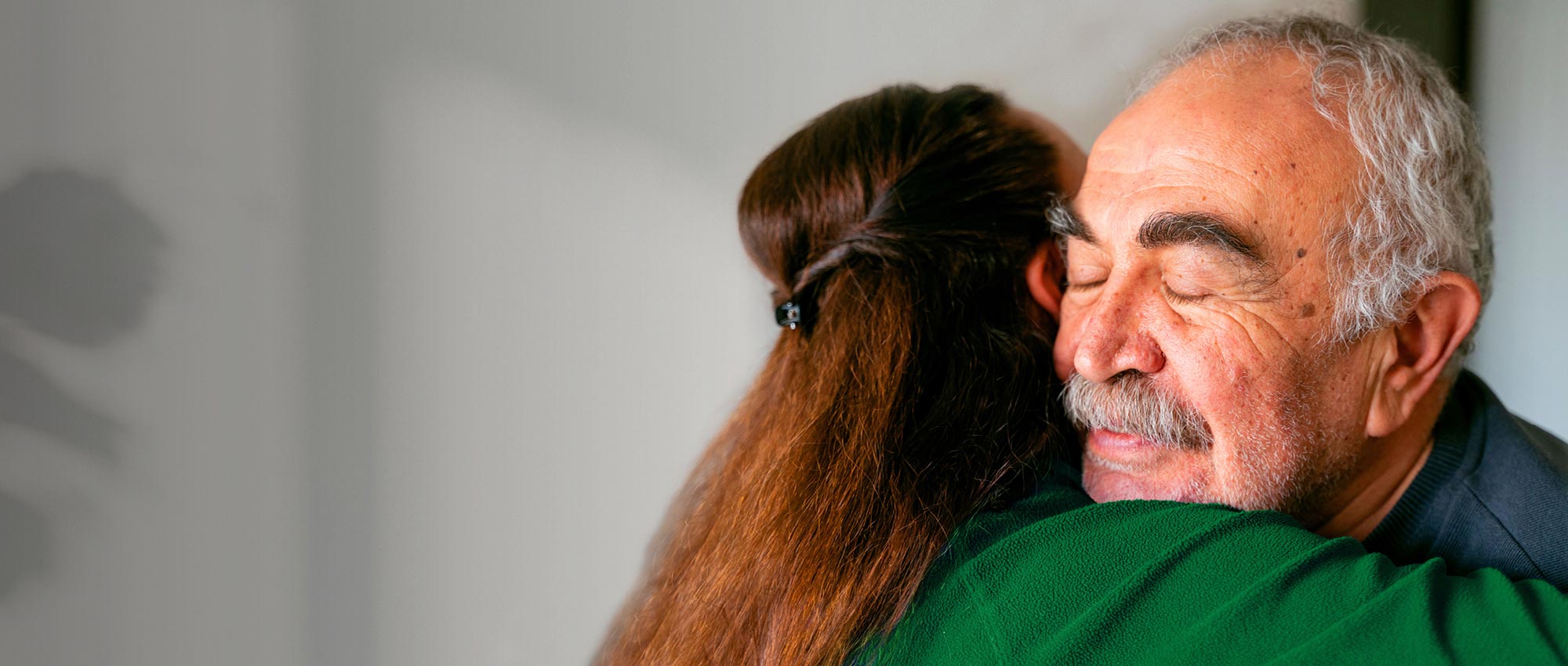Go paper-free
Amend paper-free preferences for your statements and communications.
Let us support you through the practical and money-related matters when someone dies.

Anyone can inform us of a death but to deal with accounts you’ll need to be either:
The will helps with what you need to do next. It may have details about the funeral and will name 1 or more executors.
An executor of a will is the person named to carry out their wishes. There should be at least 1 executor and you should let them know what’s happened as soon as possible.
If Lloyds or Bank of Scotland is named as the executor, call us on 0800 056 0171. Lines are open Monday to Friday 9am to 5pm. Don’t worry if there’s no will in place, you can still get in touch.
A will lets you know the wishes of the person who has died. If you can’t find the will, you may need to contact the deceased's bank, family solicitor or personal accountant, as it may be kept in safe custody.
If there’s no will, an administrator needs to be selected. You can find out more about what to do on the government website, as it can vary across the UK.
Probate is the legal process that decides who can manage the money, property, and belongings of someone who has died – also known as the estate.
The person who applies to manage the estate legally is often called the personal representative.
If you aren’t sure what probate is or whether you need it, please give us a call on 0800 015 0012. Lines are open 8am to 6pm, 7 days a week.
Please visit these websites for support services that can help:
Visit: gov.uk/when-someone-dies
National Association of Funeral Directors 0121 711 1343 or visit nafd.org.uk
The National Society of Allied and Independent Funeral Directors (SAIF) 0345 230 6777 or visit saif.org.uk
Going through a bereavement can mean to take on new responsibilities. To help with confidence using the internet, not only for banking but for other things too, we have our Digital Helpline where we are offering free 1-2-1 training sessions.
Visit: halifax.co.uk/helpcentre/get-skills-and-support-near-you
Visit: nhs.uk/mental-health/feelings-symptoms-behaviours/feelings-and-symptoms/grief-bereavement-loss/
Support, counselling, education, advice and information following a bereavement.
Visit: cruse.org.uk
Visit: citizensadvice.org.uk
The government Tell Us Once service
This is a service that lets you tell government organisations about a death. If this is offered, you can let key local and government agencies know over the phone or online.
Once you have registered the death, the staff will explain how it works. They’ll tell you which of these departments will be told:
Visit: Tell Us Once - GOV.UK (www.gov.uk)
This is a free service. It allows you to tell other banks and insurance companies of a death at the same time.
Visit: deathnotificationservice.co.uk
We know that getting mail for someone who has died can be upsetting. The Bereavement Register is a free service that can help get names removed from mailing lists.
Visit: thebereavementregister.org.uk/ or call 0207 089 6403
|
Assets |
Belongings that have a financial value, including money, investments, property and their possessions. |
|---|---|
|
Beneficiary |
A person or an organisation who’s been left something in a will or trust. |
|
Confirmation |
In Scotland the probate is called confirmation. |
|
Current valuation |
A document that confirms the value of any remaining cash or stock held within the person’s accounts at the time of death. |
|
Distribution of assets |
This is the process of selling assets held within a share dealing account as instructed by the named executor of the account. |
|
Estate |
All of the person’s assets, are usually detailed in their will. |
|
Executor |
The person, named in a will, who carries out the wishes of a person who’s died. |
|
Grant of representation |
A legal document that outlines who can deal with the estate left by the person who’s died. |
|
Grant of Probate |
The legal court document that confirms the executors' authority to deal with an estate. If there’s a will, you’ll need to get a Grant of Probate from the Probate Registry. If the estate is held in joint names and passes automatically to the surviving owner (as is often the case with married couples), you may not need to apply for probate. |
|
Intestate |
The term is used when a person has died without a will being made. |
|
Letters of Administration |
If there is no executor named in a will, then this lets a named person deal with the estate. |
|
Liabilities |
This covers any debt left when someone passes, and costs involved with settling an estate. |
|
Personal representatives |
The executors and administrators are called personal representatives as a group. |
|
Probate |
The process to get permission from the court to deal with the deceased person’s estate. |
|
Trade |
A deal to buy or sell an investment such as shares. |
|
Trust |
This is when money or property is held for someone under restrictions, such as until they reach a certain age. A trust can also allow assets to go to someone else before they pass. |
|
Will |
A legal document drawn up and witnessed during the person’s lifetime that outlines who receives a share of any assets when they pass. |
Understand what happens with each different type of account we have for a person that has died.
|
What happens? |
Regular payments |
Statements and letters |
|---|---|---|
|
What happens?
|
Regular payments
|
Statements and letters
|
|
What happens? |
Taking money out |
Regular payments |
|---|---|---|
|
What happens? Accounts will be transferred to the remaining account holder and stay open. |
Taking money out The remaining account holder will be able to use the account as normal. If there is a cheque book, it will be reissued in the remaining account holder’s name. |
Regular payments Standing orders and Direct Debits will continue and the remaining account holder can be given a list of payments to check. |
A spouse or civil partner can claim an Additional Permitted Subscription (APS) allowance on their ISA.
Claiming an APS gives the spouse or civil partner an extra tax-free ISA allowance to the value of the deceased’s ISA. For example, if they held £20,000 in their ISA this can be added on top of the spouse or civil partner’s ISA allowance for the tax year. On registering the bereavement, we’ll discuss this as an option.
If the person who died was a trustee of a child’s account a new trustee is needed. If the child is 16 or over, you’ll need to decide if the money can be given to the child.
How much Inheritance Tax needs to be paid will depend on the value of the estate and who inherits it. See www.gov.uk/inheritance-tax to find out more.
If you are looking after an investment account, we can give additional help and practical support on our Investments page.
If you need help with a Share Dealing Account, please call 0800 876 6847 or +44 (0) 113 270 1154 from abroad. Lines are open Monday to Friday 8am to 5pm.
|
What happens? |
Making payments |
Mortgage options |
|---|---|---|
|
What happens?
|
Making payments If you want to still make mortgage payments while probate is received, this can be arranged. |
Mortgage options Once probate is in place, you have the option to pay off the mortgage. |
|
What happens? |
Making payments |
Mortgage options |
|---|---|---|
|
What happens?
|
Making payments We appreciate that some people find it hard to keep payments up to date, while trying to look after the estate. If payments aren’t made, the account will fall into arrears and the amount owed will increase. This could affect the mortgage holder’s credit rating. We’ll let them know if the account is in arrears. |
Mortgage options Once probate is in place, you have the option to pay off the mortgage. |
If you need to speak to one of our Mortgage Advisers call us on 0345 850 3705. Lines are open Monday to Friday, 8am to 8pm and Saturday 9am to 4pm.
Any personal debt in 1 or more sole accounts can be paid from the estate - representatives aren’t personally liable for the debt.
|
Overdraft |
Personal loan |
Credit card |
|---|---|---|
|
Overdraft You’ll need to speak to our specialist bereavement team to find out if there is any money in the estate to pay back the overdraft. |
Personal loan
|
Credit card
|
|
Overdraft |
Personal loan |
|---|---|
|
Overdraft Responsibility for the overdraft passes to the remaining account holder. |
Personal loan Responsibility for the repayments passes to the remaining account holder on the loan. The loan can also be paid off in full. |
If further support is needed, speak to our Specialist Bereavement Team call us on 0800 028 1057 or +44 (0) 113 366 0145 from abroad. Lines are open 8am to 8pm, 7 days a week.
|
Cover on a property |
If no one is living in the property, or if someone else has moved in |
I have financial interest in the property, but I’m not named on the policy |
|---|---|---|
|
Cover on a property
|
If no one is living in the property, or if someone else has moved in It’s important to contact us to tell us of any changes. This will allow us to tell you if the policy can continue or not and what will happen next. |
I have financial interest in the property, but I’m not named on the policy We may be able to add you to the existing policy. We’ll need to check a few things with you. This will include your details and if the current cover remains suitable. |
|
Cover on a property |
|---|
|
Cover on a property The policy can be changed to a sole name. It’s important to speak to us to make sure the cover is still suitable. We’ll also need to check the billing details. This will make sure future payments come from an active account. |
If you need further help or to update a policy, speak to Home Customer Services:
Lines are open Monday to Friday, 8am to 6pm and Saturday 9am to 1pm.
The person who has died may have had accounts you weren’t aware of. We’re part of a wider group, so if they had accounts with any of the companies listed, we’ll inform them. Other companies will need you to contact them.
|
Companies we’ll contact for you |
Companies you’ll need to speak to |
|---|---|
|
Companies we’ll contact for you Lloyds Bank of Scotland Scottish Widows Clerical Medical MBNA Birmingham Midshires |
Companies you’ll need to speak to Black Horse: 0344 824 8888 Lex Autolease: 0800 389 3690 Lloyds Bank Car Finance: 0333 202 7946 Bank of Scotland Car Finance: 0333 202 7943 Halifax Car Finance: 0333 202 7940 Intelligent Finance 0345 609 4343 |

As part of our wider group, we can introduce you to the Lloyds Bank Estate Administration Service. Helping bereaved families deal with various legal, financial and practical matters. From helping you obtain probate - to taking on the role of executor, we can be involved as little or as much as you need.
Our initial support and guidance is fee-free and without obligation. If you'd like to find out more, you can speak to one of our bereavement advisers on 0800 056 0171 or +44(0)1733 286 482 if calling from abroad. Lines are open Monday to Friday, 9am to 5pm.
Calls and online sessions may be monitored and recorded. Not all Telephone Banking services are available 24 hours a day, 7 days a week.